CBM launches national QR standard MMQR for secure transactions
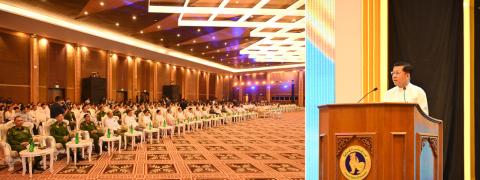
CBM launches national QR standard MMQR for secure transactions
The Central Bank of Myanmar has developed a national QR standard MMQR, enabling secure and smooth international financial transactions and remittances while keeping abreast with other countries, said the Senior General.
Chairman of the State Administration Council Prime Minister Senior General Min Aung Hlaing delivered an address as mentioned above at the launching ceremony of the national QR standard MMQR held at Jade Hall of the Myanmar International Convention Centre (MICC I) in Nay Pyi Taw yesterday.
Speaking on the occasion, the Senior General said that the people can use the MMQR created in line with the specifications of Myanmar national standards as a milestone of key payment system in Myanmar financial sector development.
The Central Bank of Myanmar is a focal organization for promoting the payment system of the country. Therefore, it makes concerted efforts to promote the payment system of the country, operate the system following the international criteria, promote public participation in financial system, ensure the financial transactions and transfers in people’s daily lives to be done in safe and easy ways, reduce cash use and adopt digital payment system more in the country and facilitate the foreign currency transfers in trade, investment and tourism industry of the country.
He continued that regarding the payment system development in Myanmar, the Myanmar Payment Organization, comprising of state-owned and privately-owned banks, was organized in 2011.
Then, the people used the international payment cards in addition to debit cards and credit cards of local banks without physically holding cash. In 2016, the Central Bank of Myanmar established the payment network system, allowing taxpayers to pay large sums of tax via the local banks.
It also needs to create access to financial services for the public residing in certain areas without any banking services while the country sees high mobile phone usage. Therefore, the Central Bank of Myanmar released laws, regulations, directives and orders for mobile banking, internet banking, mobile financial service, mobile pay and merchant acquiring service for up to the grassroots to be able to use digital payment method widely, and it also allowed systematically for government payment and small-scale payment such as electricity pay, tax, salary payment of government employees, insurance fee collection, small loan grants and collections.
Meanwhile, there was a need for a system that enables faster and more efficient connections between banks and mobile financial service providers as per the objectives of the National Payment System Strategy.
Therefore, the MMQR system using the QR code as a national level standard was developed. He then mentioned the benefits of MMQR in making different payments and the need to conduct public awareness programmes on how to make payments via MMQR.
He added that the MMQR can be used in different business sectors for payments like paying tax and electricity bills to the government, tourism industry, salary and pension payout to government employees, small-scale businesses, fuel stations, private hospitals, schools and in selling commodities.
The Central Bank of Myanmar has developed a national level standard MMQR, enabling secure and smooth international financial transactions and remittances while keeping abreast with other countries.
It is also a driving force to develop the digital business infrastructure of the country. With the advancement of technology, it needs to monitor telecom fraud while systematic arrangements are provided.
He appreciated the collaborative efforts of the Central Bank of Myanmar and relevant organizations in the successful development of MMQR and urged concerned personnel to keep working together to develop the payment system and strengthen the financial sector of the country.
Governor of Central Bank of Myanmar Daw Than Than Swe reported on the work processes of the national QR standard MMQR.
After the event, she presented a gift marking the launch of the national QR standard MMQR to the Senior General.
Afterwards, the Senior General posed for a documentary photo alongside attendees and observed the MMQR payment system and the booths displayed at the event. — MNA/KTZH
Source: The Global New Light of Myanmar
CBM launches national QR standard MMQR for secure transactions
The Central Bank of Myanmar has developed a national QR standard MMQR, enabling secure and smooth international financial transactions and remittances while keeping abreast with other countries, said the Senior General.
Chairman of the State Administration Council Prime Minister Senior General Min Aung Hlaing delivered an address as mentioned above at the launching ceremony of the national QR standard MMQR held at Jade Hall of the Myanmar International Convention Centre (MICC I) in Nay Pyi Taw yesterday.
Speaking on the occasion, the Senior General said that the people can use the MMQR created in line with the specifications of Myanmar national standards as a milestone of key payment system in Myanmar financial sector development.
The Central Bank of Myanmar is a focal organization for promoting the payment system of the country. Therefore, it makes concerted efforts to promote the payment system of the country, operate the system following the international criteria, promote public participation in financial system, ensure the financial transactions and transfers in people’s daily lives to be done in safe and easy ways, reduce cash use and adopt digital payment system more in the country and facilitate the foreign currency transfers in trade, investment and tourism industry of the country.
He continued that regarding the payment system development in Myanmar, the Myanmar Payment Organization, comprising of state-owned and privately-owned banks, was organized in 2011.
Then, the people used the international payment cards in addition to debit cards and credit cards of local banks without physically holding cash. In 2016, the Central Bank of Myanmar established the payment network system, allowing taxpayers to pay large sums of tax via the local banks.
It also needs to create access to financial services for the public residing in certain areas without any banking services while the country sees high mobile phone usage. Therefore, the Central Bank of Myanmar released laws, regulations, directives and orders for mobile banking, internet banking, mobile financial service, mobile pay and merchant acquiring service for up to the grassroots to be able to use digital payment method widely, and it also allowed systematically for government payment and small-scale payment such as electricity pay, tax, salary payment of government employees, insurance fee collection, small loan grants and collections.
Meanwhile, there was a need for a system that enables faster and more efficient connections between banks and mobile financial service providers as per the objectives of the National Payment System Strategy.
Therefore, the MMQR system using the QR code as a national level standard was developed. He then mentioned the benefits of MMQR in making different payments and the need to conduct public awareness programmes on how to make payments via MMQR.
He added that the MMQR can be used in different business sectors for payments like paying tax and electricity bills to the government, tourism industry, salary and pension payout to government employees, small-scale businesses, fuel stations, private hospitals, schools and in selling commodities.
The Central Bank of Myanmar has developed a national level standard MMQR, enabling secure and smooth international financial transactions and remittances while keeping abreast with other countries.
It is also a driving force to develop the digital business infrastructure of the country. With the advancement of technology, it needs to monitor telecom fraud while systematic arrangements are provided.
He appreciated the collaborative efforts of the Central Bank of Myanmar and relevant organizations in the successful development of MMQR and urged concerned personnel to keep working together to develop the payment system and strengthen the financial sector of the country.
Governor of Central Bank of Myanmar Daw Than Than Swe reported on the work processes of the national QR standard MMQR.
After the event, she presented a gift marking the launch of the national QR standard MMQR to the Senior General.
Afterwards, the Senior General posed for a documentary photo alongside attendees and observed the MMQR payment system and the booths displayed at the event. — MNA/KTZH
Source: The Global New Light of Myanmar
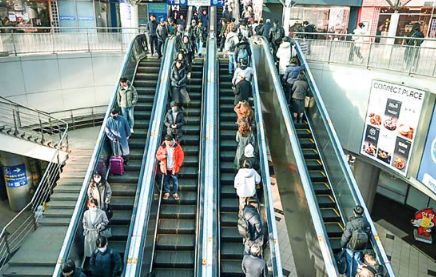
THE number of births in South Korea rose last year for the first time in more than a decade on the back of a rise in marriages, officials said on Wednesday, bucking a trend for a country battling a demographic crisis.
South Korea has one of the world’s longest life expectancies and lowest birth rates — a combination that presents a looming demographic challenge.
Seoul has poured billions of dollars into efforts to encourage women to have more children and maintain population stability.
THE number of births in South Korea rose last year for the first time in more than a decade on the back of a rise in marriages, officials said on Wednesday, bucking a trend for a country battling a demographic crisis.
South Korea has one of the world’s longest life expectancies and lowest birth rates — a combination that presents a looming demographic challenge.
Seoul has poured billions of dollars into efforts to encourage women to have more children and maintain population stability.
The crude birth rate — the number of babies born per 1,000 people — was 4.7, interrupting a continuous downward trend since 2014, according to preliminary data from Statistics Korea.
And the fertility rate, or the average number of babies a woman is expected to have in her lifetime, was 0.75, “up 0.03 from 0.72 in 2023”, it said.
“The number of births in 2024 was 238,300, an increase of 8,300 (3.6 per cent) from the previous year,” the report added. Park Hyun-jeong, an official from Statistics Korea, attributed the rise to an increase in marriages as well as shifting demographics. — AFP
Source: The Global New Light of Myanmar
THE number of births in South Korea rose last year for the first time in more than a decade on the back of a rise in marriages, officials said on Wednesday, bucking a trend for a country battling a demographic crisis.
South Korea has one of the world’s longest life expectancies and lowest birth rates — a combination that presents a looming demographic challenge.
Seoul has poured billions of dollars into efforts to encourage women to have more children and maintain population stability.
The crude birth rate — the number of babies born per 1,000 people — was 4.7, interrupting a continuous downward trend since 2014, according to preliminary data from Statistics Korea.
And the fertility rate, or the average number of babies a woman is expected to have in her lifetime, was 0.75, “up 0.03 from 0.72 in 2023”, it said.
“The number of births in 2024 was 238,300, an increase of 8,300 (3.6 per cent) from the previous year,” the report added. Park Hyun-jeong, an official from Statistics Korea, attributed the rise to an increase in marriages as well as shifting demographics. — AFP
Source: The Global New Light of Myanmar

TERRORISTS blew up the railway section at milepost 107/10-9 between Kyauktaga and Peinzalok railway stations on the Yangon-Mandalay railway in Kyauktaga Township, Bago Region, at 10 pm on 25 February, causing the railway section between Kyauktaga and Peinzaloke temporarily closed.
The regional officials and security forces members proceeded to the site promptly for inspection, and the MR staff replaced two destroyed rail tracks to reopen the railway section as quickly as possible.
TERRORISTS blew up the railway section at milepost 107/10-9 between Kyauktaga and Peinzalok railway stations on the Yangon-Mandalay railway in Kyauktaga Township, Bago Region, at 10 pm on 25 February, causing the railway section between Kyauktaga and Peinzaloke temporarily closed.
The regional officials and security forces members proceeded to the site promptly for inspection, and the MR staff replaced two destroyed rail tracks to reopen the railway section as quickly as possible.
After the maintenance, the railway section was reopened at 3:30 pm on 26 February. Since 1 February 2021, these terrorist groups have been implicated in 174 mining incidents and explosions within railway areas and stations, 80 blasts on railway bridges, and 16 instances of torching stations and employee housings. Their actions aim to destabilize the rule of law and endanger the safety of travellers, drawing widespread condemnation from the public. — MNA/KTZH
Source: The Global New Light of Myanmar
TERRORISTS blew up the railway section at milepost 107/10-9 between Kyauktaga and Peinzalok railway stations on the Yangon-Mandalay railway in Kyauktaga Township, Bago Region, at 10 pm on 25 February, causing the railway section between Kyauktaga and Peinzaloke temporarily closed.
The regional officials and security forces members proceeded to the site promptly for inspection, and the MR staff replaced two destroyed rail tracks to reopen the railway section as quickly as possible.
After the maintenance, the railway section was reopened at 3:30 pm on 26 February. Since 1 February 2021, these terrorist groups have been implicated in 174 mining incidents and explosions within railway areas and stations, 80 blasts on railway bridges, and 16 instances of torching stations and employee housings. Their actions aim to destabilize the rule of law and endanger the safety of travellers, drawing widespread condemnation from the public. — MNA/KTZH
Source: The Global New Light of Myanmar
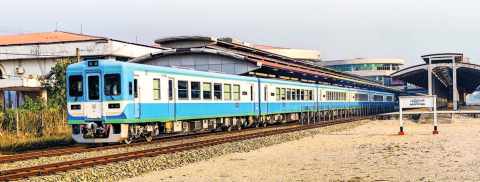
The total travel time, including stops at stations, for the Yangon-Mandalay route will be approximately 11 hours, while the Yangon-Nay Pyi Taw-Yangon route will take about five and a half hours.
The total travel time, including stops at stations, for the Yangon-Mandalay route will be approximately 11 hours, while the Yangon-Nay Pyi Taw-Yangon route will take about five and a half hours.
The Ministry of Transport and Communications, through Myanmar Railways, is set to launch a new service connecting Yangon-Nay Pyi Taw and Mandalay-Nay Pyi Taw with modern air-conditioned DEMU trains starting on 28 February. The new train sets, which have been imported from Japan, will be used for the Yangon-Nay Pyi Taw (No 7) and Nay Pyi Taw-Yangon (No 8) routes, as well as the Mandalay-Nay Pyi Taw (No 28) and Nay Pyi Taw-Mandalay (No 27).
The new DEMU trains on the Yangon-Nay Pyi Taw route will depart Yangon station at 6 am, reaching Nay Pyi Taw at around 11:30 am. Meanwhile, the air-conditioned trains on the Nay Pyi Taw-Yangon route will leave Nay Pyi Taw at noon and arrive in Yangon at 5:30 pm. The Mandalay-Nay Pyi Taw trains will depart from Mandalay station at 6 am and arrive in Nay Pyi Taw at 11 am. The Nay Pyi Taw-Mandalay trains will leave Nay Pyi Taw at noon and reach Mandalay at 5 pm.
Each train set will consist of four first-class coaches, two upper-class coaches and a total of six carriages, accommodating 312 passengers on the Yangon-Nay Pyi Taw route and 330 passengers on the Mandalay-Nay Pyi Taw route. Ticket prices for the Yangon-Nay Pyi Taw and Nay Pyi Taw-Yangon routes will be K19,000 for first class, K28,000 for upper class, and K7,000 for ordinary class on the Mandalay-Nay Pyi Taw and Nay Pyi Taw-Mandalay routes.
Tickets for the entire Yangon-Mandalay route, including both directions will cost K26,000 for first class, and K39,000 for upper class and will be available for purchase three days in advance. Passengers will be able to transfer between the DEMU trains and air-conditioned trains at Nay Pyi Taw station.
Throughout the Yangon-Mandalay route, the trains will stop at Bago, Pyu, Toungoo, Nay Pyi Taw and Thazi stations and the total travel time including stops at stations will be approximately 11 hours. On the Yangon-Nay Pyi Taw-Yangon route, the travel time will be about five hours and a half. — MNA/KZL
Source: The Global New Light of Myanmar
The total travel time, including stops at stations, for the Yangon-Mandalay route will be approximately 11 hours, while the Yangon-Nay Pyi Taw-Yangon route will take about five and a half hours.
The Ministry of Transport and Communications, through Myanmar Railways, is set to launch a new service connecting Yangon-Nay Pyi Taw and Mandalay-Nay Pyi Taw with modern air-conditioned DEMU trains starting on 28 February. The new train sets, which have been imported from Japan, will be used for the Yangon-Nay Pyi Taw (No 7) and Nay Pyi Taw-Yangon (No 8) routes, as well as the Mandalay-Nay Pyi Taw (No 28) and Nay Pyi Taw-Mandalay (No 27).
The new DEMU trains on the Yangon-Nay Pyi Taw route will depart Yangon station at 6 am, reaching Nay Pyi Taw at around 11:30 am. Meanwhile, the air-conditioned trains on the Nay Pyi Taw-Yangon route will leave Nay Pyi Taw at noon and arrive in Yangon at 5:30 pm. The Mandalay-Nay Pyi Taw trains will depart from Mandalay station at 6 am and arrive in Nay Pyi Taw at 11 am. The Nay Pyi Taw-Mandalay trains will leave Nay Pyi Taw at noon and reach Mandalay at 5 pm.
Each train set will consist of four first-class coaches, two upper-class coaches and a total of six carriages, accommodating 312 passengers on the Yangon-Nay Pyi Taw route and 330 passengers on the Mandalay-Nay Pyi Taw route. Ticket prices for the Yangon-Nay Pyi Taw and Nay Pyi Taw-Yangon routes will be K19,000 for first class, K28,000 for upper class, and K7,000 for ordinary class on the Mandalay-Nay Pyi Taw and Nay Pyi Taw-Mandalay routes.
Tickets for the entire Yangon-Mandalay route, including both directions will cost K26,000 for first class, and K39,000 for upper class and will be available for purchase three days in advance. Passengers will be able to transfer between the DEMU trains and air-conditioned trains at Nay Pyi Taw station.
Throughout the Yangon-Mandalay route, the trains will stop at Bago, Pyu, Toungoo, Nay Pyi Taw and Thazi stations and the total travel time including stops at stations will be approximately 11 hours. On the Yangon-Nay Pyi Taw-Yangon route, the travel time will be about five hours and a half. — MNA/KZL
Source: The Global New Light of Myanmar
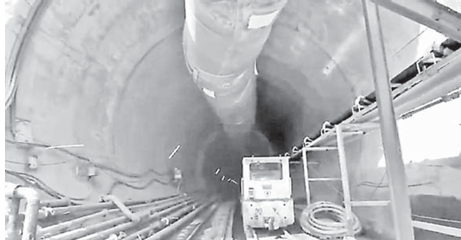
NEW DELHI February 22
At least eight workers were trapped and many others injured Saturday after a portion of an under-construction tunnel collapsed in the southern Indian state of Telangana, officials said.
The collapse took place in the Srisailam Left Bank Canal tunnel in Nagarkurnool District, about 207 km south of Hyderabad, the capital city of Telangana.
According to the officials, the tunnel collapsed when some workers were repairing a leak inside.
Reports said 50 workers were in the tunnel at the time of the accident.
NEW DELHI February 22
At least eight workers were trapped and many others injured Saturday after a portion of an under-construction tunnel collapsed in the southern Indian state of Telangana, officials said.
The collapse took place in the Srisailam Left Bank Canal tunnel in Nagarkurnool District, about 207 km south of Hyderabad, the capital city of Telangana.
According to the officials, the tunnel collapsed when some workers were repairing a leak inside.
Reports said 50 workers were in the tunnel at the time of the accident.
While some managed to escape, eight workers were feared trapped inside, an official said.
Rescue operations have been carried out.
Xinhua
Source: Myawady Daily Newspaper
NEW DELHI February 22
At least eight workers were trapped and many others injured Saturday after a portion of an under-construction tunnel collapsed in the southern Indian state of Telangana, officials said.
The collapse took place in the Srisailam Left Bank Canal tunnel in Nagarkurnool District, about 207 km south of Hyderabad, the capital city of Telangana.
According to the officials, the tunnel collapsed when some workers were repairing a leak inside.
Reports said 50 workers were in the tunnel at the time of the accident.
While some managed to escape, eight workers were feared trapped inside, an official said.
Rescue operations have been carried out.
Xinhua
Source: Myawady Daily Newspaper

February 20, 2025
The iPhone 16e will be available to pre-order in Singapore from Feb. 21, and it will be available from Feb. 28.
While it will have features similar to those of the iPhone 16 range, such as the action button and a USB-C charging port, the iPhone 16e will only have one camera lens.
February 20, 2025
The iPhone 16e will be available to pre-order in Singapore from Feb. 21, and it will be available from Feb. 28.
While it will have features similar to those of the iPhone 16 range, such as the action button and a USB-C charging port, the iPhone 16e will only have one camera lens.
Apple boasts the redesigned 48MP Fusion camera, which has the same resolution as all other iPhone 16 models. The iPhone 16e will also be able to support Apple Intelligence when it launches in April 2025.
The new model will be available in a black or white matte finish with 128GB, 256GB, or 512GB of storage. Prices start from S$949, which is S$350 cheaper than the starting price of an iPhone 16.
Source: mothership.com
February 20, 2025
The iPhone 16e will be available to pre-order in Singapore from Feb. 21, and it will be available from Feb. 28.
While it will have features similar to those of the iPhone 16 range, such as the action button and a USB-C charging port, the iPhone 16e will only have one camera lens.
Apple boasts the redesigned 48MP Fusion camera, which has the same resolution as all other iPhone 16 models. The iPhone 16e will also be able to support Apple Intelligence when it launches in April 2025.
The new model will be available in a black or white matte finish with 128GB, 256GB, or 512GB of storage. Prices start from S$949, which is S$350 cheaper than the starting price of an iPhone 16.
Source: mothership.com
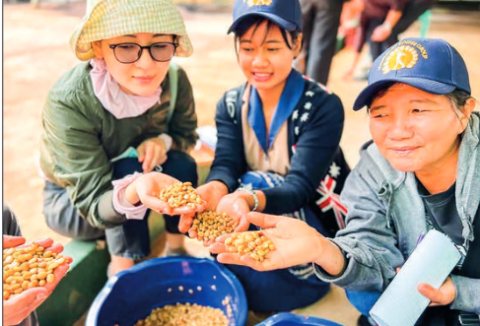
THE Myanmar Coffee Association announced that the new Coffee Quality Institute-accredited Robusta course, CQI-certified Robusta for Arabica Lovers (Batch 2), will be organized by CQI Lecturer experts and will provide information on new coffee market opportunities.
THE Myanmar Coffee Association announced that the new Coffee Quality Institute-accredited Robusta course, CQI-certified Robusta for Arabica Lovers (Batch 2), will be organized by CQI Lecturer experts and will provide information on new coffee market opportunities.
This course covers the history and biology of Robusta coffee, new Robusta market opportunities, coffee cultivation and production, practices, coffee quality, and other unique features. It is useful for anyone working in the coffee industry, including producers, quality assessors, and coffee lovers.
Throughout the course, market statistics, cultivation and production practices, and coffee quality comparisons with relevant Arabica will be provided. This class aims to introduce Robusta coffee by CQI coffee experts and to help learners understand the potential of Fine Robusta.
The training period is from 10 am to 4 pm on 1-2 March at Myanmar Coffee Exchange Co Ltd, Yangon. The training fee is K700,000 and K650,000 for members. The course includes coffee and cake in the morning, lunch in the afternoon, and coffee and cake in the evening.
Accommodation and travel expenses will have to be covered by the participants. The number of participants is limited and it is on a first-come first-served basis.
Those who wish to attend are requested to register by email at myanmarcoffeexchange@gmail.com or by phone or Viber at 09 784888808, 09 420020869 by 27 February. — MT/ZN
Source: The Global New Light of Myanmar
THE Myanmar Coffee Association announced that the new Coffee Quality Institute-accredited Robusta course, CQI-certified Robusta for Arabica Lovers (Batch 2), will be organized by CQI Lecturer experts and will provide information on new coffee market opportunities.
This course covers the history and biology of Robusta coffee, new Robusta market opportunities, coffee cultivation and production, practices, coffee quality, and other unique features. It is useful for anyone working in the coffee industry, including producers, quality assessors, and coffee lovers.
Throughout the course, market statistics, cultivation and production practices, and coffee quality comparisons with relevant Arabica will be provided. This class aims to introduce Robusta coffee by CQI coffee experts and to help learners understand the potential of Fine Robusta.
The training period is from 10 am to 4 pm on 1-2 March at Myanmar Coffee Exchange Co Ltd, Yangon. The training fee is K700,000 and K650,000 for members. The course includes coffee and cake in the morning, lunch in the afternoon, and coffee and cake in the evening.
Accommodation and travel expenses will have to be covered by the participants. The number of participants is limited and it is on a first-come first-served basis.
Those who wish to attend are requested to register by email at myanmarcoffeexchange@gmail.com or by phone or Viber at 09 784888808, 09 420020869 by 27 February. — MT/ZN
Source: The Global New Light of Myanmar
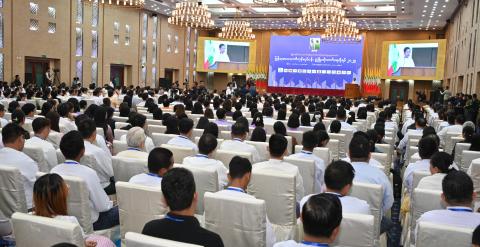
NAY PYI TAW February 19
The opening ceremony of Myanmar Food Industry Development Forum (2025) was held at MICC II here this morning, addressed by Chairman of State Administration Council Prime Minister Senior General Min Aung Hlaing.
NAY PYI TAW February 19
The opening ceremony of Myanmar Food Industry Development Forum (2025) was held at MICC II here this morning, addressed by Chairman of State Administration Council Prime Minister Senior General Min Aung Hlaing.
Also present were SAC Joint Secretary General Ye Win Oo, SAC members, union ministers, union level dignitaries, the Nay Pyi Taw Council chair, senior military officers from the Office of the Commander-in-Chief, deputy ministers, heads of department, the president and members of Union of Myanmar Federation of Chambers of Commerce and Industry, the chair and members of Myanmar Food Processors and Exporters Association, representatives of affiliated associations, entrepreneurs, officials and invited guests.
In his keynote address, the Senior General said a nation’s economic development is measured by GDP. Calculation of GDP is based on three major sectors agricultural sector, industrial sector and services sector. In setting up an industrial nation based on agriculture, agricultural raw materials play a pivotal role, while electricity and energy are also important inputs. Hence, the three commissions, industrial development commission, electric and energy development commission and agriculture development commission, were set up for harmonious advancement of the country’s industrial sector and economy.
Food, clothing and shelter are the three main components for survival. Of the three, food is an essential and most basic daily requirement. Distribution of quality food at fair prices will ensure food sufficiency and accessibility for the public and availability of food that meets export standards. In this regard, the government is applying multiple means for the progress of the internal food production industry.
Emergence of a better economic environment for development of food industry, increase in production of quality and safe food all along the production chain of the industry, assurance of domestic food sufficiency and import-substitution for export market penetration, adoption of new measures for continuous development of food industry, simplification of food industryrelated laws and procedures, and broader distribution of techniques, norms and information are the goals of the forum.The country has an adequate quantity of main raw material supply ready for food industry. The total number and percentage of food manufacturing enterprises is highest at 23,887 or 49.63 percent among the registered private industries.
Of the registered private industries in industrial zones, the number of food production businesses was the highest at 2,004. Of the 49,025 registered MSMEs, those related to the food industry take the top position with a total number of 9,984.
Serious attention must be paid to the food industry whose number is high in the private production and business sectors.
The objective of fostering the growth and success of MSME businesses is to bolster the domestic economy, in other words, to support domestic manufacturing.
In this effort, the primary and essential requirement for manufacturing is raw materials.
Therefore, the policy has been established to prioritize the production of domestic and regional raw materials.Regionally produced agricultural and farming products serve as reliable raw materials.From this point, it will be necessary to take gradual steps to replace imports and boost exports.During the recent MSME exhibition held across various states and regions, numerous positive developments were observed.It is a fact that enhanced product quality and packaging have significantly boosted sales and purchasing power.Therefore, efforts must be made to meet the needs of and support local food businesses that are focused on ensuring domestic consumption and expanding exports.
This is why the Myanmar Food Industry Development Forum is being held today.It is believed that this forum will provide an opportunity to observe, discuss, and exchange insights on the weaknesses, strengths, challenges, and opportunities within the local food industry.
Only through collective efforts to ensure that tasks are carried out efficiently and swiftly can progress be made. Therefore, all are urged to further strengthen government-private sector cooperation, keeping national and public interests at the forefront.
Only through close cooperation between the government and the private sector to meet needs can production and the flow of commodities be improved.It is essential to openly discuss the challenges faced by those working on the ground, identify solutions, and coordinate their implementation.
The key point to remember is that everyone must implement the projects quickly and efficiently, understanding that they are working for the benefit of the country.
Therefore, it is important to encourage and support business owners who are working to improve the country’s economy, while collaborating to develop the nation’s industrial production sector. Business owners are also urged to strive for further development of their manufacturing industries, with a focus on public and national interests.
Following that, a video clip on Myanmar Food Industry Development was shown. Subsequently, U Aye Win, Chairman of the Myanmar Federation of Chambers of Commerce and Industry, explained the holding of the Myanmar Food Industry Development Forum (2025).
Afterward, U Aye Win, Chairman of the Myanmar Federation of Chambers of Commerce and Industry, and U Aung Shwe, Chairman of the Myanmar Food Processors and Exporters Association, presented the Senior General with a commemorative medal to mark the opening of the Myanmar Food Industry Development Forum (2025).
Following that, the attendees of the ceremony, along with the Senior General, posed for a group photo.
Afterward, the Senior General and the attendees of the ceremony toured the Myanmar Food Industry Development Forum to explore the locally produced food products and exhibits with interest. Then, the Senior General inquired about the presentations made by the officials and provided suggestions on the required measures.
The Myanmar Food Industry Development Forum (2025) will run until February 20. During the forum, sector-specific discussions will take place to foster the development of Myanmar’s food production.
Source: Myawady Web Portal
NAY PYI TAW February 19
The opening ceremony of Myanmar Food Industry Development Forum (2025) was held at MICC II here this morning, addressed by Chairman of State Administration Council Prime Minister Senior General Min Aung Hlaing.
Also present were SAC Joint Secretary General Ye Win Oo, SAC members, union ministers, union level dignitaries, the Nay Pyi Taw Council chair, senior military officers from the Office of the Commander-in-Chief, deputy ministers, heads of department, the president and members of Union of Myanmar Federation of Chambers of Commerce and Industry, the chair and members of Myanmar Food Processors and Exporters Association, representatives of affiliated associations, entrepreneurs, officials and invited guests.
In his keynote address, the Senior General said a nation’s economic development is measured by GDP. Calculation of GDP is based on three major sectors agricultural sector, industrial sector and services sector. In setting up an industrial nation based on agriculture, agricultural raw materials play a pivotal role, while electricity and energy are also important inputs. Hence, the three commissions, industrial development commission, electric and energy development commission and agriculture development commission, were set up for harmonious advancement of the country’s industrial sector and economy.
Food, clothing and shelter are the three main components for survival. Of the three, food is an essential and most basic daily requirement. Distribution of quality food at fair prices will ensure food sufficiency and accessibility for the public and availability of food that meets export standards. In this regard, the government is applying multiple means for the progress of the internal food production industry.
Emergence of a better economic environment for development of food industry, increase in production of quality and safe food all along the production chain of the industry, assurance of domestic food sufficiency and import-substitution for export market penetration, adoption of new measures for continuous development of food industry, simplification of food industryrelated laws and procedures, and broader distribution of techniques, norms and information are the goals of the forum.The country has an adequate quantity of main raw material supply ready for food industry. The total number and percentage of food manufacturing enterprises is highest at 23,887 or 49.63 percent among the registered private industries.
Of the registered private industries in industrial zones, the number of food production businesses was the highest at 2,004. Of the 49,025 registered MSMEs, those related to the food industry take the top position with a total number of 9,984.
Serious attention must be paid to the food industry whose number is high in the private production and business sectors.
The objective of fostering the growth and success of MSME businesses is to bolster the domestic economy, in other words, to support domestic manufacturing.
In this effort, the primary and essential requirement for manufacturing is raw materials.
Therefore, the policy has been established to prioritize the production of domestic and regional raw materials.Regionally produced agricultural and farming products serve as reliable raw materials.From this point, it will be necessary to take gradual steps to replace imports and boost exports.During the recent MSME exhibition held across various states and regions, numerous positive developments were observed.It is a fact that enhanced product quality and packaging have significantly boosted sales and purchasing power.Therefore, efforts must be made to meet the needs of and support local food businesses that are focused on ensuring domestic consumption and expanding exports.
This is why the Myanmar Food Industry Development Forum is being held today.It is believed that this forum will provide an opportunity to observe, discuss, and exchange insights on the weaknesses, strengths, challenges, and opportunities within the local food industry.
Only through collective efforts to ensure that tasks are carried out efficiently and swiftly can progress be made. Therefore, all are urged to further strengthen government-private sector cooperation, keeping national and public interests at the forefront.
Only through close cooperation between the government and the private sector to meet needs can production and the flow of commodities be improved.It is essential to openly discuss the challenges faced by those working on the ground, identify solutions, and coordinate their implementation.
The key point to remember is that everyone must implement the projects quickly and efficiently, understanding that they are working for the benefit of the country.
Therefore, it is important to encourage and support business owners who are working to improve the country’s economy, while collaborating to develop the nation’s industrial production sector. Business owners are also urged to strive for further development of their manufacturing industries, with a focus on public and national interests.
Following that, a video clip on Myanmar Food Industry Development was shown. Subsequently, U Aye Win, Chairman of the Myanmar Federation of Chambers of Commerce and Industry, explained the holding of the Myanmar Food Industry Development Forum (2025).
Afterward, U Aye Win, Chairman of the Myanmar Federation of Chambers of Commerce and Industry, and U Aung Shwe, Chairman of the Myanmar Food Processors and Exporters Association, presented the Senior General with a commemorative medal to mark the opening of the Myanmar Food Industry Development Forum (2025).
Following that, the attendees of the ceremony, along with the Senior General, posed for a group photo.
Afterward, the Senior General and the attendees of the ceremony toured the Myanmar Food Industry Development Forum to explore the locally produced food products and exhibits with interest. Then, the Senior General inquired about the presentations made by the officials and provided suggestions on the required measures.
The Myanmar Food Industry Development Forum (2025) will run until February 20. During the forum, sector-specific discussions will take place to foster the development of Myanmar’s food production.
Source: Myawady Web Portal
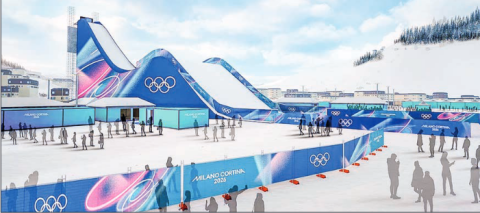
WITH less than one year remaining to the opening of the 2026 Milan-Cortina Winter Olympics, preparations are advancing at a brisk pace, as evidenced by record-breaking ticket sales and robust volunteer recruitment.
At a press conference held on Tuesday at the Foreign Press Association in Rome, Andrea Varnier, Chief Executive Officer of the Milano-Cortina Foundation, announced that nearly 300,000 tickets had been sold in just six days since the public ticketing programme was launched on 6 February.
WITH less than one year remaining to the opening of the 2026 Milan-Cortina Winter Olympics, preparations are advancing at a brisk pace, as evidenced by record-breaking ticket sales and robust volunteer recruitment.
At a press conference held on Tuesday at the Foreign Press Association in Rome, Andrea Varnier, Chief Executive Officer of the Milano-Cortina Foundation, announced that nearly 300,000 tickets had been sold in just six days since the public ticketing programme was launched on 6 February.
Varnier revealed that the ticketing platform received over 350,000 requests from around the globe, with 70 per cent coming from abroad.
In parallel, the volunteer recruitment program has exceeded expectations. Initially, the organizers planned to recruit 18,000 volunteers. However, the response has been overwhelming, with 96,000 applications received to date, including a notable number of submissions from China which ranks fourth after Italy, the United States, and France. "This not only reflects the global influence of the Winter Olympics but also indicates that the preparations are progressing with unprecedented enthusiasm," Varnier
added. — Xinhua
Source: The Global New Light of Myanmar
WITH less than one year remaining to the opening of the 2026 Milan-Cortina Winter Olympics, preparations are advancing at a brisk pace, as evidenced by record-breaking ticket sales and robust volunteer recruitment.
At a press conference held on Tuesday at the Foreign Press Association in Rome, Andrea Varnier, Chief Executive Officer of the Milano-Cortina Foundation, announced that nearly 300,000 tickets had been sold in just six days since the public ticketing programme was launched on 6 February.
Varnier revealed that the ticketing platform received over 350,000 requests from around the globe, with 70 per cent coming from abroad.
In parallel, the volunteer recruitment program has exceeded expectations. Initially, the organizers planned to recruit 18,000 volunteers. However, the response has been overwhelming, with 96,000 applications received to date, including a notable number of submissions from China which ranks fourth after Italy, the United States, and France. "This not only reflects the global influence of the Winter Olympics but also indicates that the preparations are progressing with unprecedented enthusiasm," Varnier
added. — Xinhua
Source: The Global New Light of Myanmar
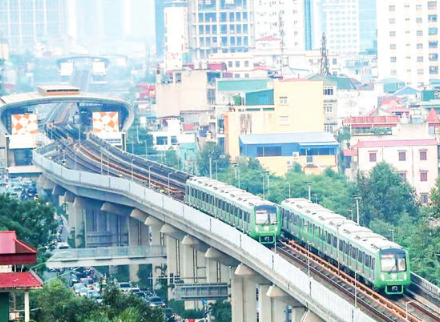
VIETNAM’S National Assembly on Wednesday approved investment for the Lao CaiHanoi-Hai Phong railway project, Vietnam News Agency reported.
According to the proposal by the Vietnamese government, the main railway line will stretch approximately 390.9 km, with three branch lines totaling about 27.9 kilometres.
The railway will pass through seven provinces and two cities, namely Lao Cai, Yen Bai, Phu Tho, Vinh Phuc, Hanoi, Bac Ninh, Hung Yen, Hai Duong and Hai Phong.
VIETNAM’S National Assembly on Wednesday approved investment for the Lao CaiHanoi-Hai Phong railway project, Vietnam News Agency reported.
According to the proposal by the Vietnamese government, the main railway line will stretch approximately 390.9 km, with three branch lines totaling about 27.9 kilometres.
The railway will pass through seven provinces and two cities, namely Lao Cai, Yen Bai, Phu Tho, Vinh Phuc, Hanoi, Bac Ninh, Hung Yen, Hai Duong and Hai Phong.
It will be designed to have a speed of 80 kilometres to 160 kilometres per hour. The project aims to construct a modern, integrated rail line to meet both domestic and international transportation demands, particularly between Vietnam and China. — Xinhua
Source: The Global New Light of Myanmar
VIETNAM’S National Assembly on Wednesday approved investment for the Lao CaiHanoi-Hai Phong railway project, Vietnam News Agency reported.
According to the proposal by the Vietnamese government, the main railway line will stretch approximately 390.9 km, with three branch lines totaling about 27.9 kilometres.
The railway will pass through seven provinces and two cities, namely Lao Cai, Yen Bai, Phu Tho, Vinh Phuc, Hanoi, Bac Ninh, Hung Yen, Hai Duong and Hai Phong.
It will be designed to have a speed of 80 kilometres to 160 kilometres per hour. The project aims to construct a modern, integrated rail line to meet both domestic and international transportation demands, particularly between Vietnam and China. — Xinhua
Source: The Global New Light of Myanmar

